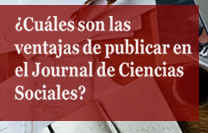The good society: defining and measuring wellbeing. Between complexity and limit
Resumen
Investigadores de todo el mundo han dedicado años y se encuentran trabajando activamente en la definición de conceptos y medidas acerca del bienestar. En algunos casos el debate se simplificó a partir de la pregunta si un indicador podía reemplazar al PBI. En este sentido y para definir que es una “Buena sociedad” (Good society) es necesario tener en cuenta dos conceptos: complejidad y limite. El debate en relación a esta definición data de Aristoteles y resultaría imposible poder revisar todas las definiciones que se han intentado. En este artículo se intenta proveer una interpretación acerca de los instrumentos que se han utilizado a fin de ayudar a la diferenciación entre las propuestas emergentes serías y las meramente propagandísticas.
Descargas
Citas
Berger-Schmitt, R. and Noll, H.-H. (2000) Conceptual Framework and Structure of a European System of Social Indicators, EuReporting Working Paper No. 9, Centre for Survey Research and Methodology (ZUMA) – Social Indicators Department, Mannheim.
Diener, E., Suh, E. (1997) Measuring quality of life: economic, social, and subjective indicators, Social Indicators Research, vol. 40, pp. 189–216.
Eurostat (2000) Definition of quality in statistics and Standard quality report, Eurostat.
Felce, D.; Perry, J. (1995). Quality of Life: Its Definition and Measurement. Research in Developmental Disabilities, 16 (1), pp. 51-74
Horn, R.V., (1993) Statistical Indicators, Cambridge University Press, Cambridge.
Johansson, S. (2002). Conceptualizing and Measuring Quality of Life for National Policy. Social Indicators Research, 58, pp. 13-32.
Maggino, F. (2009) The state of the art in indicators construction in the perspective of a comprehensive approach in measuring well-being of societies, Firenze University Press, Archivio E-Prints, Firenze.
Maggino, F.; Ruviglioni, E. (2011) Preaching to the Choir: Are the Commission’s Recommendations Already Applied?. Social Indicators Research, Vol. 102, Issue 1, pp. 131-156.
Nuvolati, G. (1997). Uno specifico settore di applicazione degli indicatori sociali: La qualità della vita. In: Zajczyk F. Il mondo degli indicatori sociali, una guida alla ricerca sulla qualità della vita. La Nuova Italia Scientifica, Roma, pp. 69-94.
Patel, S.; M. Hiraga, and Wang, L. (World Bank) D. Drew and D. Lynd (Unesco) (2003) A Framework for Assessing the Quality of Education Statistics, World Bank – Development Data Group and UNESCO – Institute for Statistics.
Sirgy M.J. (2011) Theoretical Perspectives Guiding QoL Indicators Project, Social Indicators Research, vol. 103, pp.1–22. Sirgy, M.J.: A.C. Michalos, A.L. Ferriss, R.A. Easterlin,
D. Patrick and W. Pavot (2006) The Quality-of-Life (QOL) Research Movement: Past, Present, and Future, Social Indicators Research, vol. 76, n.3, pp. 343-466.
Stiglitz, J. E.; Sen, A. & J.-P. Fitoussi eds (2009) Report by the Commission on the Measurement of Economic Performance and Social Progress, Paris. http://www.stiglitz-sen-fitoussi.fr/en/index.htm
Zapf, W. (1975) Le système d’indicateurs sociaux:
approches et problèmes, Revue Internationale des Sciences Sociales, Vol. XXVII, n. 3.
Zapf, W. (1984) Individuelle Wohlfahrt: Lebensbedingungen und Wahrgenommene Lebensqualität, in W.Glatzer e Zapf W. (eds.) Lebensqualität in der Bundesrepublik, Frankfurt a. M. – New York, Campus, pp. 13-26.
Los autores conservan los derechos sobre su obra garantizando a esta revista el derecho de primera publicación, comprometiéndose a citar el Journal de Ciencias Sociales como referencia de la publicación original.
Los trabajos publicados en el Journal se publican bajo los términos que se indican en la Licencia de Creative Commons con la Atribución 4.0 Internacional (CC BY 4.0).




























